"I wanted students to have access to a university library, and I didn't want [SUMMA] to have a 'church camp' feel. Sewanee was the place I had in mind."
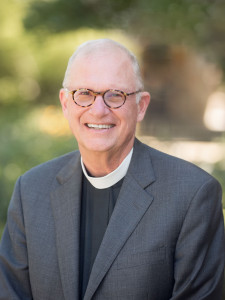
Is capital punishment morally justifiable? Should guns be allowed in church? Should the church and state be separate entities? The Rev. Dr. Chris Keller, P’08, doesn’t shy away from these weighty questions, and he believes high school students are capable of intelligently tackling them too. In 2012, Keller created the SUMMA Theological Debate Summer Camp, which annually brings rising ninth through 12th graders to Sewanee for a week of sharpening their rhetoric skills while expanding their understanding of Christianity. (There’s also traditional camp fun—hiking, music, games, arts and crafts, and a talent show, among other activities.) Recently, Keller pledged significant funding to SUMMA through his family’s charitable foundation while issuing two recruitment challenges. If SUMMA averages at least 50 campers per session in 2027 and 2028, the Keller Family Foundation will provide additional major support. If increased enrollment is maintained from 2028 through 2033, the foundation will create an endowment to fund SUMMA in perpetuity. This year’s camp will take place from July 16-24, and students can apply here through May 31, 2024.
Keller’s interest in rhetoric and debate originated at his family’s dinner table, while he was growing up in Little Rock, Arkansas. As one of six siblings, he had plenty of sparring partners. Though Keller’s father is the late Rt. Rev. Christoph Keller Jr., P’74, H’68, 10th bishop of the Episcopal Diocese of Arkansas (and a former Sewanee regent and trustee), Chris says that family debates weren’t limited to religious issues. “The topic could be race, religion, literature, sports—not enough sports to suit me.” He adds that his father generally chose to observe rather than participate, but “my mother had her sleeves rolled up and was punching away with the rest of us.”
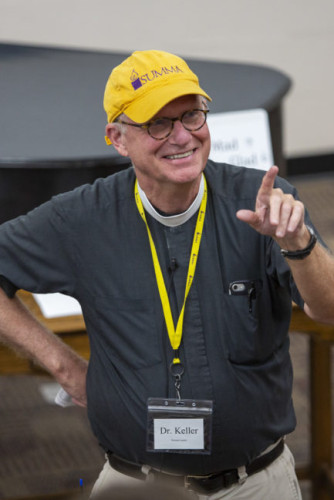
SUMMA camp session
As student body president at Little Rock’s Central High School, Keller used the power of persuasion to assemble central Arkansas’s first organized soccer league. He says that a school trip to Europe sparked his passion for the sport, and he capitalized on his friendships with two other student presidents to convince them to form soccer teams at their schools. A group from Little Rock Air Force Base heard about Keller’s effort and created a team, too. The four-team league began competing in the fall of 1972, and “Little Rock schools have had soccer ever since,” Keller says.
After earning a B.A. in American Studies from Amherst College, Keller enrolled in Harvard University’s History of American Civilization graduate program. He was on track to receive a Ph.D. when he discerned a call to priesthood. Despite his father’s vocation, “My parents never even whispered to me, ‘Do you think you might want to be a priest?’” he says. Yet, one afternoon while riding Boston’s Red Line across the Charles River, he had a “low-key epiphany,” as he describes it. “It just dawned on me as a possibility that I might be called.” Months later, after consulting with a mentor from Amherst and with his bishop (aka, his father), Keller left Harvard and entered Episcopal Divinity School. He graduated with an M.Div. in 1982.
From Boston, Keller returned to Arkansas and served at churches in Pine Bluff, Fort Smith, and Van Buren. In 1990, he founded St. Margaret’s Church in Little Rock, SUMMA’s conceptual birthplace. Nine years into his tenure at St. Margaret’s, Keller moved with his family to New York to attend General Theological Seminary (GTS), where he earned a doctor of theology degree—and midway through his studies at GTS, a chance conversation offered an interesting new challenge. As Keller describes it, he phoned the Rev. Peggy Bosmyer, T’99, former professor of contextual education at the School of Theology, to congratulate her on her appointment as vicar of St. Margaret’s, and Bosmyer requested a favor. “She said, ‘I want you to come back [to St. Margaret’s] while you’re writing your dissertation and start an institute for theological studies.’” Keller took the charge as more than an academic exercise. “By then, it was clear that Christianity’s place in society was changing, and the church was shrinking,” he says. “Christian faith in our culture was becoming more precarious.” As he designed the institute, Keller also considered how he might promote theological inquiry among high school students. “I was looking ahead to what SUMMA became.”
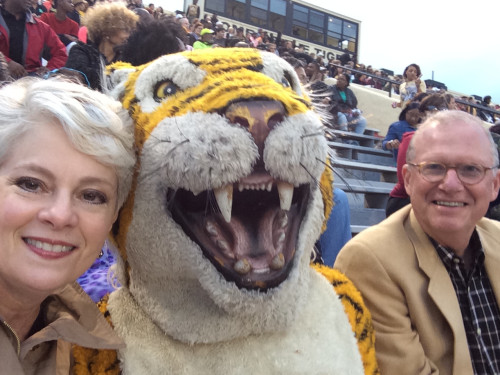
The task of launching a theological program for teenagers might intimidate some priests, but Keller was energized by the idea. “I’d started a few things by then,” he says. “I’d started a soccer league and a church. I knew a little bit about what it takes to get an organization up and running—a lot of planning and a lot of elbow grease.” He enlisted the Rev. Cindy Fribourgh, a colleague at St. Margaret’s, to help with logistics, and he identified Sewanee as the perfect location for the program. “I wanted [SUMMA] to be on a college campus,” Keller says. “I wanted students to have access to a university library, and I didn’t want the program to have a ‘church camp’ feel. Sewanee was the place I had in mind.”
At the time, Keller’s son, Christoph, was a Sewanee undergraduate. During a dinner party for University parents, Chris pitched SUMMA to then-Vice Chancellor John McCardell and asked about the possibility of renting space on campus. McCardell agreed to a collaboration. “So, we set [SUMMA] up as a two-year experiment,” Keller says. While he considered the immediate challenges of starting the program, he also planned for its future. “I hoped that Sewanee might want to eventually own [SUMMA], so that it could be a program that would outlast my involvement.”
Keller notes that SUMMA’s first year had “some bumps and bruises” but was successful overall. “The main thing that we were trying to test worked—the kids could learn to debate in five days,” he says. “It was an extraordinary experience for them.” Before the program’s second summer, he arranged a meeting with McCardell and the Rt. Rev. J. Neil Alexander, P’02, H’02, former dean of the School of Theology and University chancellor, at the Blue Chair Café in Sewanee. “I was going to ask them to come see the program in action,” he says, “and to see if we could make it a Sewanee program like Education for Ministry.” The day before the meeting, Sewanee announced the opening of the Beecken Center, a resource that offers experiences, curricula, and tools for adult and youth lay theological education. “I said, ‘God, you have dropped something in my lap,” Keller says, ‘It’s up to me to not blow this.’” As it turned out, Keller had no need to be anxious—McCardell and Alexander were completely on board.
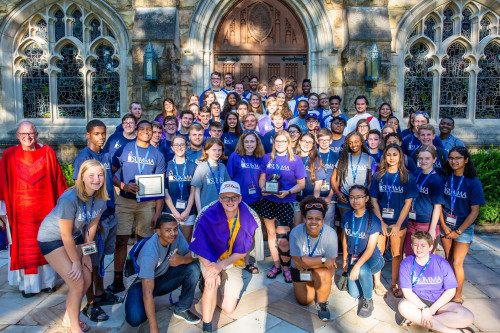
In the 12 years since SUMMA’s founding, the program has changed in “tons of ways,” Keller says—though he’s quick to note that the format and mission have stayed the same. In 2015, Keller was installed as dean and rector of Trinity Episcopal Cathedral in Little Rock, and Cindy Fribourgh took over as SUMMA’s program director. Five years later, the COVID-19 pandemic necessitated moving the program online for a summer and significantly limiting participation through 2021. After the 2021 camp session, Fribourgh retired, and SUMMA again shifted to new leadership. The program is now overseen by Sewanee Rhetoric and Women’s and Gender Studies Associate Professor Melody Lehn and Visiting Instructor of Rhetoric the Rev. Warren Swenson, T’18, who serve as director and associate director, respectively.
With Lehn and Swenson at the helm, SUMMA’s affiliation has broadened from Sewanee’s School of Theology to include the College of Arts and Sciences. Keller says he sees the transition as a positive development, and he’s proud of the way SUMMA’s new administrators have deepened its connections to the University community. From their first day directing the program, he says, “[Lehn and Swenson] were creating new networks beyond what Cindy and I—who are from off campus—had the capacity or even the imagination to do. They were tapping into the University library in ways beyond my ken. And I was seeing really good things start to happen.”
Keller says he hopes his family’s multi-year pledge and recruitment incentives will keep the momentum going. “I think people respond to challenges. If you give people enough time and some straw to make bricks with, then they go do it.” He notes that the Lilly Endowment Inc. has supported SUMMA with multiple grants, which were initially secured by Tom Sanders, P’16, former Sewanee foundation and development communications officer, and are now managed by Sewanee Director of Foundation and Corporate Relations Hilary Dow Ward. Ward says the foundation places a high value on SUMMA’s relationship with Sewanee. “The Lilly Endowment’s mission mirrors the aim of the University, in that they’re committed to developing generations of servant-leaders,” she says. “I think the foundation sees the collaboration between SUMMA and Sewanee as an important pipeline for producing empathetic, intellectually curious scholars who will elevate the quality of national discourse and, through faith, change the world.”
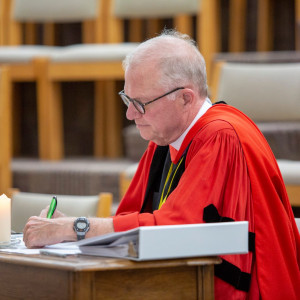
Keller retired from Trinity Episcopal Cathedral in 2023, and he also stepped away from direct involvement with SUMMA—but his work promoting Christianity as an intellectual experience continues. In recognition of his legacy as SUMMA’s founder and his lifelong commitment to forming inquisitive young theologians, the program’s annual keynote lecture was recently named the Keller Keynote in Theology and Oratory. A full copy of the resolution honoring Keller and titling the Keller Keynote can be read here.
In May, Keller will receive an honorary degree from the University and deliver the main address at Sewanee’s Baccalaureate ceremony, and he says he plans to incorporate SUMMA into his remarks. In his view, the program responds to three pervasive challenges affecting America. “The lost capacity for thoughtful reasoning, the fracture of civil discourse, and the widespread loss of faith in God that comes with the responsibility of love for our neighbor—these are all problems in our country,” he says. “SUMMA is at Sewanee for a reason: because it’s an academic environment that supports all of those concerns. That’s why I wanted the program to be at Sewanee. And it fits like a hand in a glove.”

